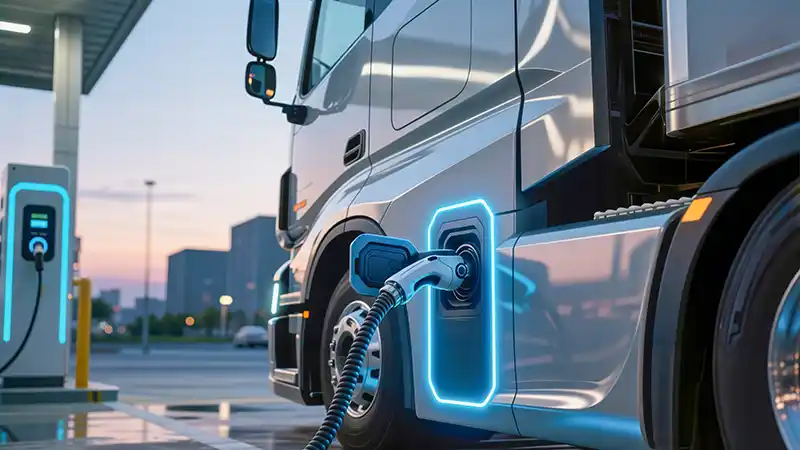The commercial trucking industry stands at a crossroads in 2024, with owner-operators facing a crucial decision between traditional diesel trucks and emerging electric commercial vehicles. This comprehensive analysis explores the real costs, benefits, and operational considerations of electric trucks versus diesel trucks in today's freight market.
Commercial Truck Investment: Understanding Electric vs. Diesel Costs
Today's commercial fleet operators face a significant price gap when comparing electric and diesel trucks. While a new Class 8 diesel truck typically requires a $175,000 investment, electric semi trucks demand upwards of $300,000. However, commercial vehicle tax incentives, including federal credits up to $40,000 for zero-emission trucks, help narrow this electric truck cost differential.
Electric Truck Infrastructure: The Hidden Costs of Fleet Electrification
Converting to electric commercial vehicles requires more than just purchasing trucks - fleet operators must invest in comprehensive charging infrastructure. Commercial vehicle charging stations, including Level 2 chargers and DC fast charging equipment, represent significant upfront costs in fleet electrification. However, utility company incentives for commercial EV charging installation can offset these electric truck infrastructure expenses by 20-40%.
Operating Costs: Electric Semi Trucks vs. Diesel Fleet Operations
The daily operating expenses of electric commercial vehicles tell a compelling story. While diesel trucks consume fuel at 50-70 cents per mile, electric semi trucks operate at just 15-25 cents per mile in energy costs. This electric truck efficiency translates to potential annual savings of $15,000-$25,000 per commercial vehicle, significantly impacting fleet operating costs.
Commercial Vehicle Range: Electric Truck Capabilities vs. Diesel Performance
Modern electric semi trucks offer 200-300 miles of range per charge, while diesel trucks maintain their 600-1,000 mile advantage between refueling stops. However, as commercial EV charging networks expand and electric truck battery technology improves, this range gap continues narrowing for regional freight operations.
Zero-Emission Trucking: Environmental Benefits and Market Advantages
Fleet electrification offers more than environmental benefits. Zero-emission trucks provide access to restricted urban zones, while green logistics programs often command premium rates. Commercial electric vehicles help fleet operators meet increasingly strict emissions regulations while positioning their business for future sustainability requirements.
Electric Truck Maintenance: Long-term Fleet Operating Considerations
Electric commercial vehicles promise reduced maintenance costs through simpler powertrains and regenerative braking systems. However, fleet operators must consider electric truck battery replacement costs and specialized EV maintenance requirements in their long-term planning for commercial fleet operations.
Weather Impact on Electric Semi Truck Performance
Climate conditions significantly affect electric truck range and performance. Cold weather can reduce electric semi truck range by 20-30%, while extreme heat demands increased battery cooling. These environmental factors require careful route planning and load management for efficient electric fleet operations.
Commercial Electric Vehicle Technology: Future of Fleet Transportation
Advancing electric truck technology continues improving range, charging speed, and reliability. Fleet electrification becomes increasingly viable as battery capacity grows and commercial EV charging infrastructure expands. Forward-thinking fleet operators monitor these developments while planning their transition to zero-emission trucks.
Electric Fleet Implementation: Strategic Approach to Commercial EV Adoption
Successful fleet electrification requires comprehensive planning. Smart operators begin with route analysis to identify optimal applications for electric semi trucks, develop charging infrastructure strategies, and implement thorough driver training programs for electric commercial vehicles.
The Future of Commercial Trucking: Electric vs. Diesel Fleet Operations
As the transportation industry evolves toward sustainable solutions, understanding both current capabilities and future developments helps fleet operators make informed decisions about electric truck adoption. Whether leading the charge or taking measured steps toward fleet electrification, commercial vehicle operators must prepare for an increasingly electric future in freight transportation.
Remember, successful transition to electric commercial vehicles requires balancing immediate operational needs with long-term fleet sustainability goals. As one veteran fleet manager notes, "The future of commercial trucking is electric - the only question is timing your transition for maximum business advantage."












